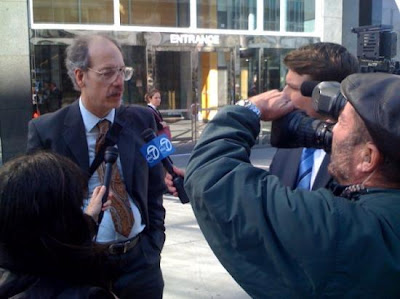
""Public Citizen attorney Paul Levy, who had asked to intervene in the case on behalf of Wikileaks, speaks to reporters outside the federal courthouse in San Francisco after the judge hands down his ruling.""
SAN FRANCISCO-(24hoursnews)-Wikileaks is getting its domain name back.
After spending more than three hours hearing arguments from a raft of attorneys--two representing the Swiss bank that fought to get the site's plug pulled and about 10 who have been trying to get the site back online--a federal judge here has ruled in favor of Wikileaks.
Wikileaks, which uses Wikileaks.org as its primary domain, is a whistle-blowing site that focuses on posting leaked documents.
"The court denies the motion for preliminary injunction, and the court hereby dissolves the injunction against (domain name registrar) Dynadot, and the litigation may now proceed," said U.S. District Judge Jeffrey White, who had called a brief recess around 11:40 a.m. PST, indicating that he was inclined to revisit his order from earlier this month that effectively pulled the plug on the Wikileaks.org domain name.
Free speech advocates immediately hailed as a victory the decision on Friday of a federal judge to withdraw a prior order turning off the Web address of the site Wikileaks.org. But the reasoning of United States District Judge Jeffrey S. White also means that the court may dodge having to grapple with some of the meaty First Amendment questions posed by the case and touched on repeatedly at a lengthy hearing in San Francisco.
The lawsuit, brought by a Swiss bank and its Cayman Islands subsidiary against Wikileaks and Dynadot, the San Mateo, Calif., company that is the registrar for the domain name Wikileaks.org, became a cause célèbre for organizations like the American Civil Liberties Union, Public Citizen and the Electronic Frontier Foundation. Such organizations responded with a barrage of court filings in the wake of an order signed by Judge White last month that required Dynadot to disable the Wikileaks.org address, making it more difficult – but far from impossible – for Internet users to get to materials published by Wikileaks.
The bank, Bank Julius Baer & Co., claimed that Wikileaks had displayed confidential, personally identifiable account information of its customers, as a result of possibly criminal actions by a former employee. Lawyers for the bank on Friday repeatedly told Judge White that Julius Baer clients had a right to keep their account information private and that there was no compelling interest to justify their disclosure. In this way lawyers for the bank set up a conflict between freedom of speech and the right to personal privacy.
“All of this is private info that is not newsworthy,” said William J. Briggs, one of the lawyers for the bank. If one of the affected customers had been Ken Lay, the late, disgraced former chief executive of Enron, then perhaps there would be news value, Mr. Briggs continued, but that was not the case here.
“Here there have been absolutely no targeted individuals identified,” Mr. Briggs said. “There’s just been wholesale leaking of private banking information.”
Judge White questioned lawyers about the possibility of redacting names from the documents. But Joshua Koltun, a lawyer for a graduate student whom the bank said was an “officer” of Wikileaks, warned that the names could prove to be essential information.
“That’s how you identify who’s been salting away money in accounts,” Mr. Koltun said, drawing laughter from reporters in the courtroom. (The laugher in turn drew a rebuke from Judge White, who said sternly, “I won’t tolerate that.”)
The judge and the lawyers also struggled mightily to define Wikileaks, which defines itself as an organization “founded by Chinese dissidents, journalists, mathematicians and startup company technologists, from the U.S., Taiwan, Europe, Australia and South Africa.”
Traditional entities, like companies and individuals, have citizenship status that can determine when they are subject to a particular court’s jurisdiction. But what is Wikileaks, which has not been represented by a lawyer throughout these proceedings?
“Whatever this entity is, it has not filed a response,” Judge White observed.
Paul Alan Levy, a lawyer for Public Citizen in Washington, argued that the bank had brought more publicity to the documents on Wikileaks than ever by filing its lawsuit and obtaining the order affecting the site’s domain name. Under such circumstances, Mr. Levy asked the judge, “Should you give them any relief to help them unring the bell?” The question implicitly was whether the victims of public disclosure on the Web have any shot at redress.
After hours of discussion that suggested the judge’s level of concern with reaching the correct outcome, Judge White looked unhappy that he could not think of a way to help the bank customers affected by the release of the documents. But he said that he feared the initial order suspending Wikileaks.org raised serious questions of unjustified prior restraint on free speech, and that in any event, once the documents were online, the court might well be powerless.
“Maybe that’s just the reality of the world that we live in,” Judge White said. “When this genie gets out of the bottle, that’s it.”

No comments:
Post a Comment